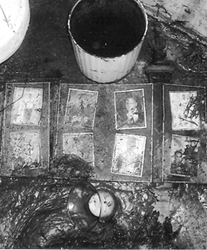Editor’s note: This is the second of a three-part series highlighting Loyola community members who have been affected by Hurricane Katrina and its aftermath.
Hurricane Katrina did more than just fill Randy Englert’s house with almost nine feet of water and oil. It also scattered his loved ones and destroyed his entire extended family’s possessions and memorabilia.
Englert, biology sophomore, comes from a Chalmette family that is deeply rooted in tradition. At least three times a week, the Englert family would go to his grandmother’s house and gather around her table for a big meal.
“My whole family lived within a four-mile radius of each other. I would see them all the time – it’s just what we did,” Englert said.
On the Saturday before Hurricane Katrina made landfall, Englert’s family decided to evacuate.
“We didn’t think we were going to be gone for more than three days,” Englert said. “Just like usual.”
Englert and his mother packed their car accordingly, bringing a few changes of clothes and an extra pair of shoes. In a rush to evacuate, they left some cherished things behind.
“My mother and I had a bit of a communication problem,” Englert said. “We had packed a box full of old pictures to take just in case. Pictures of my grandparents, my mother as a child and my baby pictures – we had over six hundred photos in there. I thought she put the box in the car, and she thought I did.”
Englert didn’t get far before he realized the box had been left behind on his mother’s bed. He didn’t turn back because, at worst, he believed that his home would take on two feet of water.
Nine hours after leaving Chalmette, the Englert family found themselves in El Dorado, Ark.
“Six people, a dog and a parrot in one hotel room – it wasn’t fun,” Englert said.
From the cramped hotel room, Englert watched as national news crews broadcasted live from New Orleans.
“I was a little frustrated at first because they just kept showing the French Quarter,” Englert said. “Then they started reporting about the looting and the violence. I became sort of, well, embarrassed.”
It wasn’t long before Englert knew he wasn’t going to be going home anytime soon. His mother accepted a temporary transfer offer from her employer in Huntsville, Ala. Slowly the six members of Englert’s family began splitting apart.
Englert and his mother spent nearly two months in Huntsville before they were allowed to go back into the city to survey their home. Neither he nor his mother knew exactly how much water the house had taken on during the storm.
“We knew that it was a lot when our neighbor called and told us that he had docked a boat from his second story window,” Englert said.
In late October, Englert and his mother were able to get back into their home.
“In a way, we were kind of lucky. We had two months to prepare for what we were going to see,” Englert said.
Englert was stunned when he began driving through his deserted neighborhood.
“The streets were empty,” he said. “All of the houses empty. They were missing roofs, walls, windows … they were just the way the storm left them. And most of them still are.”
When Englert finally saw his home for the first time in two months, he was stunned. From the outside everything appeared to be in tact. “It was crazy,” Englert said. “There wasn’t one shingle out of place, no shattered windows – nothing.”
From a distance, the red chunky brick had camouflaged a thick layer of crude oil that had leaked from the refinery only a few blocks away.
When Englert went inside he realized the severity of the damage. Everything was covered in black and green mold. There was a thick layer of mud on every flat surface, a dining room chair hanging from a sconce and furniture completely flipped upside down.
“I just walked from room to room snapping pictures. It was really hard to see anything because some of the windows were still boarded up, but the smell – the smell was awful,” Englert said.
He took photos in every room. When Englert got to his mother’s room, he found the box that they had left behind.
“It was still on the bed, exactly where we put it,” he said.
From the 600 photos they packed, six were salvaged.
“Almost everything we had was ruined, but I am most upset about losing those pictures,” Englert said. “I would have liked to have had them to show my kids one day. To show them what life was like, what their great grandparents looked liked, their grandparents looked like. They will definitely hear me talk about them, but they’ll never be able to make that connection.”
Englert now lives in Slidell with his mother. His once close-knit family is now scattered across the South.
“We went from a four-mile radius to a four-state radius,” Englert said. “Looking back, everything before the storm seemed so perfect, and I didn’t even notice.”
Jared Bailey can be reached at [email protected].

Englert did not return to his home for two months after the storm. When he came back, he found his possessions covered in a mixture of oil, water and mud. A local refinery leaked oil into the flood waters that covered his neighborhood. (Photo courtesy of Randy Englert)

Randy Englert, biology sophomore, tutors student in organic chemistry in a study room at the library. Englert, a Chalmette native, and his entire family lost their homes in Hurricane Katrina. He and his mother have moved to a house in Slidell.







